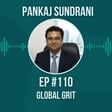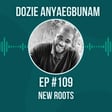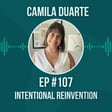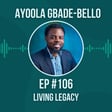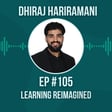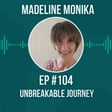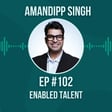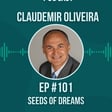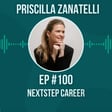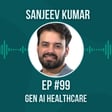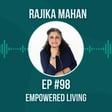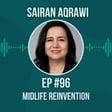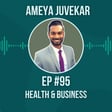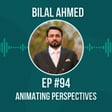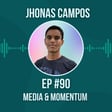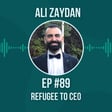Become a Creator today!Start creating today - Share your story with the world!
Start for free
00:00:00
00:00:01

#108 Equity Care w/ Jessica Bindra
Jessica is a caregiver, researcher, and healthcare leader dedicated to advancing equity in dementia care. Drawing on over a decade of experience in healthcare and her personal journey caring for her father, Jessica has championed systemic improvements that make care more inclusive, culturally responsive, and person-centered.
Currently completing her Master’s at York University, she is focused on closing service gaps in dementia care for equity-seeking groups. In our conversation, Jessica shares how lived experience and research can come together to transform healthcare and empower caregivers across Canada.
Recommended
Transcript
Introduction to Jessica Bindra and 'Equity Care'
00:00:20
Jessica Bindra
...of these inspiring individuals exploring...
00:00:30
Find A Way Podcast
Hello everyone, this is episode 108, Equity Care, and our guest today is Jessica Bindra.
Jessica's Background and Personal Experiences
00:00:36
Find A Way Podcast
Jessica is a caregiver, researcher, and healthcare care leader dedicated to advancing equity in dementia care.
00:00:43
Find A Way Podcast
Drawing on over a decade of experience in healthcare and her personal journey caring for her father, Jessica has championed systemic improvements that make care more inclusive, culturally responsive, and person-centered.
00:00:56
Find A Way Podcast
Currently completing her master's at york York University, she is focused on closing service gaps in dementia care for equity-seeking groups. In our conversation, Jessica shares how lived experiences and research can come together to transform healthcare care and empower caregivers across Canada.
Family Immigration Story and Healthcare Lessons
00:01:14
Find A Way Podcast
Welcome, Jessica.
00:01:16
Jessica Bindra
hi thank you for having me.
00:01:18
Find A Way Podcast
It's such a pleasure to have you today. Before we start with some questions, can you share more about your business?
00:01:25
Jessica Bindra
I, sure. um so I actually started a lot. My parents were immigrated, immigrated to Canada from India. And, um, like that story, they worked really hard and still that within us, that work ethic of working to your summers after schools, weekends, and, um,
00:01:46
Jessica Bindra
they slowly started getting into franchising and that became a whole new learning on its
Applying Franchise and Lean Methodologies in Healthcare
00:01:52
Jessica Bindra
own. So that franchise world is where I learned about the power of standardization, how processes and well designed they were.
00:02:01
Jessica Bindra
And I created that, creating that both that consistency and sustainability. And what struck me later as I went through on my life is that, you know, You can actually use a lot of these standardizations in not-for-profits and in healthcare care when I started getting exposed to that space.
00:02:18
Jessica Bindra
And I started noticing it a lot because it was so fragmented and stretched thin. So what I did is that I brought what I learned from franchises into healthcare and social services and combined it with like all these lean methodologies, process improvement methodologies.
Ventures to Improve Healthcare Accessibility and Processes
00:02:36
Jessica Bindra
But then I added a new lens because I was learning about health equity at that time. in my undergrad and social justice. And because I believed in the healthcare needs to be both person centered and profitable, because I'm coming from a for profit place.
00:02:53
Jessica Bindra
And I noticed there was this way of not really there, they would use their resources as best as possible or as fiscally as responsible. But when you start using business principles for not for profits, it kind of becomes a game changer. And so That's what led me to my business to create qualityimprovement.ca, where I'm taking AI-driven, people-first processes um and taking that engineering platform for not-for-profits, for healthcare sectors, and it helps organization untangle this really complex space that we're in and you know pushing for excellence and quality demands while keeping lived experience at that center of every
00:03:39
Jessica Bindra
meaningful quality improvement initiative. So really asking yourself, you know, what is meaningful? Why are we doing it? And then working from that space rather than saying, okay, um we're trying to do this to get money.
00:03:55
Jessica Bindra
But actually the money and the value is in the people we serve, which is our clients,
Provider Finder and Culturally Appropriate Resources
00:04:01
Jessica Bindra
our communities. If we want to see better and healthier communities, it really is going to start with better processes in organizations.
00:04:09
Jessica Bindra
So that then later on then doves in dovetails into my second venture, which is Provider Finder. um And it's born out of my experience of being a Sikh Canadian, a caregiver to my father who was diagnosed with dementia in 2017.
00:04:26
Jessica Bindra
And trying to navigate that system for my father was extremely overwhelming, not for just myself, but my entire family, because we're coming in with these blinders about what even this disease is. And there's this misconception about what Alzheimer's is in the media. It's been very romanticized.
00:04:46
Jessica Bindra
So it really struck me as a South Asian, and I'm trying to get my father, you know, resources out there, And we couldn't find the resources at all, let alone know where to go.
00:05:00
Jessica Bindra
So just imagine there was there's no platform right now across Canada where you can go in and be like, I need to get this PSW or I need to get this.
00:05:04
Find A Way Podcast
Thank you.
00:05:10
Jessica Bindra
And maybe we can connect these allied health care forces together and be like, where can I get the kind of care that I need? And so that's where the problem is. And so from that, saw i saw Many families like mine who don't see ourselves reflected in either the research, the programs or policies. So it kind of just started driving my whole career into dementia care to provide health equity and process improvement, and kind of bring them all together neatly in this space. So Provider Finder is that tool we wished existed, which helps family find supports quickly and clearly while honoring culture, of dignity and belonging.
Challenges in Dementia Care for Families
00:05:53
Find A Way Podcast
That is so beautiful, Jessica. um I'm so glad you're taking care of that. I'm curious, what has your, you know, you've mentioned a few aspects of the experience you had, but what has your experience as a caregiver to your father with dementia taught you about the realities that families face that aren't always visible to healthcare care systems?
00:06:15
Find A Way Podcast
I'm sure you're identified um many learnings there.
00:06:17
Jessica Bindra
Oh, so there are so many, there are so many, um
00:06:17
Find A Way Podcast
Yeah.
00:06:24
Jessica Bindra
so many realities out there. um When I first started getting into dementia care, um people used to say, when you know one person living with dementia, you only know one person.
00:06:36
Jessica Bindra
Because everyone's trajectory, everyone's life experiences, the journey is so unique and different to that person because every person is unique. So you don't know what they'll forget or not forget or what people in their family, their strengths are and what their strengths are not.
00:06:55
Jessica Bindra
So it's taught me the hardest part of caregiving for a person living with dementia is that you will be invisible. to this caregiving space. And families carry exhaustion, financial strain, cultural disconnection long before the system ever sees them.
00:07:15
Jessica Bindra
And for me, the hardest truth is that it's been realizing that my father, you know, the resources that he needs, our country just doesn't have them sometimes.
Cultural Safety and the Lack of Specific Facilities
00:07:27
Jessica Bindra
For example, um my father immigrated to Canada in nineteen seventy s um the early 70s. And to this day, we don't have a South Asian, um we don't have a South Asian specific long term care home that can actually for provide them care.
00:07:46
Jessica Bindra
And there are so many communities like myself who might feel like I don't really know where to send my parents or i don't know where to go for culturally appropriate care.
00:07:46
Find A Way Podcast
Mm-hmm.
00:07:56
Jessica Bindra
I need to find people who can explain this to this disease or this type of, um yeah, this disease to people we love. And I don't know how to do that and explain it in very layman terms.
00:08:10
Jessica Bindra
And we have physicians using really great articulate words, but they're not able to bring it down so an average person might be able to understand really what's going to be happening here.
00:08:21
Jessica Bindra
So that absence of cultural safety, of not having food, language, faith, your community, it's really missing in our services. And that sense of dignity is also then missing because you can't really see yourself identified in that.
00:08:37
Jessica Bindra
And that invisibility is something that thousands of family members and caregivers then have to burden and hold on to and carry in silence. Because they're they're trying to advocate when they don't have resources. So how do you advocate for somebody when you're not equipped with the tools and the knowledge to do so?
00:08:57
Find A Way Podcast
true
00:08:57
Jessica Bindra
And so you're just like trying to figure it out as you go along.
Systemic Gaps Exposed by Personal Experiences
00:09:02
Find A Way Podcast
that's so true and i'm i'm curious like your personal journey ah clearly has shaped a lot in what you're doing your masters and everything that you're dedicating to um can you share more about how this uh created this decision get your career to dementia care and
00:09:22
Jessica Bindra
Can you hear that? I just wanted to ask you quickly. So my father's um diagnosis happened in 2017 and it kind of happened in a really traumatic way.
00:09:33
Jessica Bindra
But that actually is where I said to myself, you know, this is a big problem So diagnosis happened 2017. I had noticed it a bit when I used to work in the like the cancer space and orthopedics, but what really hit home was my dad's diagnosis. Because you know when something hit hits home, you really see the glaring holes, actually. They're not even just gaps. They're just holes in the system. And you're like, oh, wow this is bad.
00:10:02
Jessica Bindra
And at that time, i already had spent quite a bit in the healthcare system. and doing QI. So I had already said yes, looking at social determinants of health from a quality improvement perspective.
00:10:15
Jessica Bindra
on But when I got to dementia care, because it's a space where there's so many holes and gaps already and it's pretty fragmented, the inside of me already had right away clicked in that we can definitely use a franchise system in that franchise world in here by standardizing creating systems across the nation and even across little communities, smaller communities, provincially,
00:10:43
Jessica Bindra
And then federally, how we can use these processes to help close the gaps, because we all can actually build a really great system.
Using Standardized Processes for Equitable Healthcare
00:10:53
Jessica Bindra
Without reinventing the wheels, you just take the best system that is working that's already been there.
00:11:00
Jessica Bindra
and And so I really had taken that space because, you know, when we look at franchises, and we look at these for profits, there are a lot of wonderful processes and procedures that are in place, right?
00:11:12
Jessica Bindra
So it's It actually is considering how do these not-for-profits take a process in place and then focus in on equity. So focusing on those client outcomes rather than, okay, we just need to get a program out, but rather be like, who do we need to make sure we're getting programs out to?
00:11:33
Jessica Bindra
So as a Sikh Canadian, I realized that, you know, my family wasn't reflected in these researches and these programs. And my pursuit ever since has always been, you know, how am I going to bring equity seeking groups to the forefront and push them in process change?
00:11:50
Jessica Bindra
Because that's the area that I specialize in, in standardization, in processes. So being like, at what point do we say, this is a great equity process, and now we can bring it forward, and you can curate the process to meet the needs to your local communities the way you need to.
00:12:08
Jessica Bindra
And so that invisibility has made me realize that equity isn't optional, that if we integrate it into our process, you can make it a mandatory, ever natural way So that if it's designing care in a way that truly works for everybody from the get go.
00:12:26
Find A Way Podcast
That's I and love to live seeing that actually implemented and working wonderfully. So I'm thank you for doing this.
00:12:38
Find A Way Podcast
um I know. Well, I wasn't exactly a caregiver to my mother in law. She struggled with cancer for a few years, and I know my my father in law was constantly exposed to this caregiving um function.
00:12:54
Find A Way Podcast
And it's usually people describe it as both rewarding and exhausting as well.
00:12:59
Jessica Bindra
Yeah.
00:13:00
Find A Way Podcast
So how have you personally navigated this emotional and mental challenge? Because it is heavy on us. It's heavy for the people around us and around the family members that
Caregiving as 'Love in Motion'
00:13:11
Find A Way Podcast
are going through that.
00:13:12
Find A Way Podcast
So how do you personally navigate this? Great.
00:13:16
Jessica Bindra
So I think there's two things that I always say to myself that, especially in dementia care. So the first part is in caregiving. I always say that caregiving is love in motion. It's love in action in the things that you're doing. And that perspective really um keeps me going because, you know, what it it demands a lot from you.
00:13:36
Jessica Bindra
It demands your attention, it demands you physically, emotionally, always. While you're also in dementia care specifically, you know, you're losing somebody, ah actively losing somebody, right?
00:13:50
Jessica Bindra
Because they're there, yeah, on a daily basis.
00:13:50
Find A Way Podcast
on a daily basis.
00:13:53
Jessica Bindra
And so because of that, you're always like, okay, so what allowed me to keep sane, but also reminded how lucky I am that I always say this, today is my dad's best day.
00:14:08
Jessica Bindra
Today is my dad's best day because I know tomorrow is going be so different.
00:14:09
Find A Way Podcast
That's beautiful.
00:14:13
Jessica Bindra
I have no idea what tomorrow is going to go. So I just live in today with that. And I said, you know what? Today's his best day. This is the best he's going to be. and I just need to keep moving that.
00:14:25
Jessica Bindra
And so, you know, in my faith, in the Sikh faith, we say there's a lot about Seva. and selfless service. And it just reminds me that I'm so lucky to be even doing this.
00:14:40
Jessica Bindra
So I just focus on that on the small joys that I have with my dad, because at the end of the day, that's really all I'm going to have left now. And that when I look back and I go back to videos of us doing stuff with my dad, and I think I can say that for my family as well, that that's really all we have now is videos and pictures.
00:15:02
Jessica Bindra
and these memories of things that we do because that's that's it.
Turning Personal Challenges into Systemic Solutions
00:15:06
Jessica Bindra
So.
00:15:07
Find A Way Podcast
That is so profound and um I got chills multiple times while you were saying, so not only the caregiver is love in motion, I'm going to absorb that and keep that for the rest of my life.
00:15:17
Find A Way Podcast
ah Beautiful phrase and living as people's best day.
00:15:21
Jessica Bindra
my
00:15:23
Find A Way Podcast
And I think we should all take that.
00:15:25
Jessica Bindra
It really is. You know, if you know anybody living with Alzheimer's or dementia, you'll know that, you know what,
00:15:26
Find A Way Podcast
Yeah.
00:15:32
Jessica Bindra
There will be an end for it. We can pause because there's no cure. There's no actual cure. So there's just ways to pause it with these new therapies that are coming through or delay bit of it as it progresses. But it's progressive.
00:15:48
Jessica Bindra
And one day I'm going to wake up and my dad's not going to know me at all. And, you know, it's not just that. It's like his functions are going to be um deteriorating as well. Like what he's ah able to do.
00:16:01
Jessica Bindra
And, you know, just... Knowing that today's my dad's best day. And, you know, this this is limited. This is not it's not going to go on forever. It may feel like that sometimes. So it's like ah I remember getting a cup from another company and this the saying on the cup was the years are long, but the day no, the days are long, but the years are short.
00:16:23
Jessica Bindra
I honestly, I look back and I was, i i remember in those times I was like, oh my God, this is going by so ah slowly. And now when I look back, I was like, it went by too fast.
00:16:33
Find A Way Podcast
Oh, wow.
00:16:35
Jessica Bindra
Yeah. So just remember that.
00:16:36
Find A Way Podcast
What does advocacy mean to you on a personal level? And how do you sustain your passion in such a demanding space? Because it it's hard. And I'm sure there are moments that you're just like, i I can't do this. It's too much. And, you know, let me just do something else with my life. So I'm interested to seeing your point of view because you are so passionate. But how do you sustain that?
00:17:02
Jessica Bindra
um So advocacy means turning lived experience is to into systemic solutions. And so, you know, when you're on individual projects, you get frustrated and you're like, oh my God, I wish this person would just like understand what is going on here.
00:17:21
Jessica Bindra
And then you have to stop and say, you know what, I'm going to pull myself back. And remember, there's a bigger piece here.
00:17:32
Jessica Bindra
And then reminding them of the who benefit, who's actually benefiting out of this. And why are we actually sitting around the table here? So it's not just about, you know, process improvement. It's not just about ah creating, you know, meeting an accreditation status.
00:17:52
Jessica Bindra
It's about How are you amplifying voices through a process change for a greater good? So that by creating this change, this process change, how are we supporting families after us who don't face the same barriers?
Service Gaps in Dementia Care for Diverse Communities
00:18:10
Jessica Bindra
So barriers of access, barriers to programs, can't find like a program in the language that they need or a resource in that. And That includes like missing that, okay, there's a lack of South Asian long-term cares or programs and services that speak to dementia programming or invisibility in researches.
00:18:32
Jessica Bindra
And, you know, i think I kind of live in the, I live and keep myself motivated in the gaps. In the absence of stuff i is where I actually and thriving and being like, nope, we need to close the gap.
00:18:49
Jessica Bindra
And remembering that this is no longer about just my father. It's about my father. father And that's why I say this is about my family's story, my family's journey with caregiving. I'm just one person representing all of my family.
00:19:05
Jessica Bindra
But this is about my father, my family, and and my community. And so many communities out there who face the same complexities as we do, that we're all not so different after all.
00:19:21
Jessica Bindra
And I just channel that into my business and provider finders and quality improvement. And that advocacy just keeps building and just building it into every process change and the process change so we hear voices of co-creation and co-design.
00:19:32
Find A Way Podcast
That's great.
00:19:41
Jessica Bindra
of what's happening. And I take my experiences of what barriers I dealt with. And I can envision them in the policies and the processes and be like, and so what happens this if a person comes in, they don't know how to access your service, or if it's not clear, then I'm not afraid of saying it's not clear.
00:19:59
Jessica Bindra
I'm like, so if we're here to make things different, make it clear, want be kind, make it clear.
00:20:05
Find A Way Podcast
True, very true. ah you You did mention many service gaps that you feel and you've, you've on a personal level, have faced it in your journey with your father.
00:20:17
Find A Way Podcast
But in your research at York University, what are the service gaps in dementia care for the equity-seeking groups have you found most urgent to address?
00:20:27
Jessica Bindra
I think like from where I stand and even based on the research and the research has been out there for years. It's well before I even got into dementia care.
00:20:38
Jessica Bindra
There was a professor out of a university of Alberta, actually who was writing about it, who happened to be a gerontologist or internal medicine and said, we have people with equity seeking groups who are missing or South Asian communities who will be finding issues in um accessible services such as culture, language, identity, and those come in the forms of programs in places to live.
00:21:06
Find A Way Podcast
Mm-hmm.
00:21:07
Jessica Bindra
in um funding for these programs and services. And so I feel like in service gaps, while they're that the spectrum is everything from ah education and awareness, we see it in accessing programs and services, finding the right counseling in dementia care, finding education in South Asian languages for the very diverse languages that we have in South Asian communities.
00:21:35
Jessica Bindra
but then all the way down to long-term care, complex care, and then palliative care, hospice. Like we see the, there's a gap all the way through.
00:21:46
Jessica Bindra
And I say, I feel like they're all, there's no one more than the other urgent. Because until you don't get to that phase, you don't feel like that's an urgency. So when we say dying with dignity, right? Okay, I would love to do that. But don't you want to die in dignity in a space that you can identify with that knows cultural appropriate care during that phase of your life now in that new chapter?
00:22:11
Jessica Bindra
So it's all urgent.
00:22:11
Find A Way Podcast
That's more familiar to you. Yeah.
00:22:13
Jessica Bindra
It becomes all urgent.
00:22:15
Find A Way Podcast
No, lovely. ah you You, Jessica, you bring both healthcare care experience and quality improvement expertise, such as the Lean Six Sigma Black Belt.
00:22:26
Find A Way Podcast
how these ah How do these disciplines work together to create real change in dementia care?
Driving Equitable Changes through Quality Improvement
00:22:33
Find A Way Podcast
And for your perspective?
00:22:33
Jessica Bindra
um So I feel like um it's funny because a lot of people who met me, they're like, oh, you just brought everything you've learned your whole life together. I was like, basically, that's what I did. So franchising taught me standardization in a really great way.
00:22:48
Jessica Bindra
um Healthcare care gave me that equity seeking people first mentality and my own experiences. And then quality improvement really gave me the tools in how we measure these items. And gave me that lean methodology, looking at process, looking at elimination of waste.
00:23:06
Jessica Bindra
How can we do it better? we coming back to that, right? um And I think when you're a caregiver, you can't help but be honest and be like, that's bullshit. and That's not going to work.
00:23:17
Jessica Bindra
Or that actually doesn't really work.
00:23:17
Find A Way Podcast
Thank you.
00:23:19
Jessica Bindra
And, you know, it's not about always, you know, they say, oh, it's all about profit driving and you're trying to be profit driven Lean methodology is about removing waste.
00:23:32
Jessica Bindra
I don't believe in that. I don't think lean methodology is about let's remove waste. It's about give time where you need to and then remove it where you don't. Like that's what it's about. So waste is a very, very big term for a small thing that um Lean Six Sigma bell Black Belt teaches you. Really what it's trying to teach you is where's their waste?
00:23:55
Jessica Bindra
And then so that you can devote time where you need to. So when we get into these AI processes, we want to do things that have no value added to it. So, okay, the value added in documentation, maybe value added in, you know, going from one place to another, like these non-value added items that don't really happen to support the person at the end, the end user.
00:24:19
Jessica Bindra
How do we reduce that waste so that we can get more face-to-face time in counseling? or supporting people with dementia with products and services that they need rather than the administrative burden, right? Because that's actually what we need. We need more face-to-face um counseling or face-to-face interactions than we do with that.
00:24:39
Jessica Bindra
So I think um process that process engineering process improvement along with the lens of health equity and equity has been...
00:24:50
Jessica Bindra
ah ah and And having that caregiver experience has amplified the work that I do. I think that's really what's actually in amplified my work because um that's what I've been able to really hone in and say, well, is that really what people want?
00:25:09
Find A Way Podcast
no From this decade of experience in the hospital, community health, long-term care, what are the systemic shifts that you believe are the most needed to make care more inclusive and person-centered?
00:25:25
Jessica Bindra
um I think we need to move away from, and I don't know how people feel about this, but, you know, stop looking at the disease, but look at that lived experiences with a disease.
Community Collaboration for Improved Care
00:25:39
Jessica Bindra
So it's not just about getting the diagnosis, but they're they're not going to be on a journey. So how do we reshape that journey for those families, that experience with that with that disease? Because They're on now a road that we all know what the end is going to be.
00:25:59
Jessica Bindra
So how can we make it the most pleasant journey for them, right? Instead of just bringing it down about the disease. um
00:26:08
Find A Way Podcast
Thank you.
00:26:09
Jessica Bindra
I think also we really need to look at community integration. We all, there every community has these jewels and gems within communities um they we all have them, these amazing programs and services.
00:26:26
Jessica Bindra
And it's not on one organization or one business or anybody to figure it all out. But actually, it comes in the power of collective conscience and collectively working together to support system navigation.
00:26:41
Jessica Bindra
And i think that's what it's about. And I think if I had one more thing, And getting comfortable with the idea that there's no one size fits all.
00:26:53
Jessica Bindra
it's And it's okay. Like standardization will go so far and then get ready to curate the program. that's And it's okay.
00:27:01
Find A Way Podcast
No, perfect.
00:27:02
Jessica Bindra
It's okay because we're all individuals. Because at the end of the day, person-centeredness and co-creation is really at the core of what we should be doing.
00:27:13
Find A Way Podcast
and perfect um Okay, looking ahead into the future, I know it's hard to predict the future, but ah what do you hope that your platform and your advocacy will achieve for caregivers and Canadians that are navigating dementia and other complex healthcare care journey journeys?
Envisioning a 'Tinder of Healthcare'
00:27:32
Jessica Bindra
Um, honestly, i wish I can, um, if I could be like, okay, in five years, I have unlimited amount of funding and I had all the money in the world and I didn't have to worry about anything.
00:27:42
Find A Way Podcast
I like that.
00:27:46
Jessica Bindra
I would honestly make this into the Tinder of healthcare. So you can go, I honestly am trying to drive it like that.
00:27:52
Find A Way Podcast
like
00:27:54
Jessica Bindra
It would be the tender of healthcare care and you going on and be like, do I like this healthcare care provider or not? And you disrupting the healthcare care system so much so where You're no longer at the mercy of figuring out who's accepting patients, but doctors are begging you to come to them because they want you.
00:28:13
Jessica Bindra
They want to make you healthier. So let's really disrupt the healthcare system by creating Provider Finder to be that provider. place where you go in and you be able to be like, yep, this is like, if I was looking for a PSW, I'd be like swiping left and right and be like, who do I like? Who or do I not like?
00:28:32
Jessica Bindra
And then being able to be like, what physicians do I like? And and then building your circle of care, building people who who actually care about you should be the ones around you. And people who don't, well, then if it's not a good fit, it's not a good fit.
00:28:45
Jessica Bindra
And that's, if I had all the money, I would make that platform into that. And hopefully I can drive it into that.
00:28:51
Find A Way Podcast
And that's a very engaging way to describe the platform. So it's a little, you know how you say it.
00:28:56
Jessica Bindra
Yeah, I really it would be like the Tinder of health care. Like imagine going in and be like, oh I'm looking for a physician and I want it to be female. I needed to speak this language and I needed to be in this area. And that's who it is.
00:29:11
Jessica Bindra
And you're going through this thing and be like, this is what like this.
00:29:12
Find A Way Podcast
Yeah.
00:29:13
Jessica Bindra
way I like their bio. I don't really like what they're by. They seem friendly because at the end of the day, we have to, if we are not happy with our healthcare care provider, then we're not going to get the best of We want somebody who's good to spend time with us.
00:29:25
Jessica Bindra
But I feel like right now we're at the mercy because one, you can't find one and then you don't know who's accessing one.
00:29:25
Find A Way Podcast
For sure.
00:29:31
Jessica Bindra
So provider finder will help that to get to that place.
00:29:35
Find A Way Podcast
And then when you find it, you have to hang on to it, even though if it's not fit, because it's fine.
00:29:37
Jessica Bindra
Yes. Then you want to make sure you don't get too sick so they don't want to not see you. You know, like, it's a counterproductive and why we why we're trying to access a physician, right?
00:29:42
Find A Way Podcast
Exactly.
00:29:47
Jessica Bindra
And then when you do see them, you end up waiting so long.
00:29:47
Find A Way Podcast
That's
00:29:50
Jessica Bindra
So you're like, hey, I just want to be able to get in and get out. I want somebody who's able to see me virtually or maybe I do want to see somebody I i like somebody I can walk into. So shouldn't you have the ability to choose who you want and how you want it?
00:30:03
Jessica Bindra
And honestly, i really
00:30:04
Find A Way Podcast
Yeah.
00:30:05
Jessica Bindra
i Like if you ask me where I wish I could take this, I wish I could take it to a global level where people will start being be like, you know what? I'm okay of getting a provider in like Brazil.
00:30:17
Jessica Bindra
I know this great physician and I want my family physician to be that. And I'm okay to pay whatever amount it is that they're looking for if I feel like that's the way to go. And then I could just have globally disrupt how I want my healthcare system.
00:30:33
Find A Way Podcast
That's very visionary and who knows? I i think there is, well, keep working on it. I hope there's a chance for that. It would be great to get some.
00:30:42
Jessica Bindra
yeah I really do think that like.
00:30:42
Find A Way Podcast
There's some things I would like to go back in my home country home country and take care of with my, you know, ah original doctor.
00:30:49
Jessica Bindra
like so imagine you had a doctor from your home country and you're like, oh, they're so lovely and wonderful and they're willing to see you virtually.
00:30:52
Find A Way Podcast
Oh yeah.
00:30:56
Jessica Bindra
And you're like, yeah, and we're in the space of VR and everything. Yeah. So I don't really see, like, imagine Zane be like, hey, I'm sitting in my doctor's office right now.
00:31:01
Find A Way Podcast
Yeah. Why not?
00:31:06
Jessica Bindra
Let me call you back. And you're like, but you're in Toronto. And you're like, no, yeah, but they're in like Trinidad so or in India. And so, you know, I just want to sit there and we're having a conversation just like that. and you're like, oh, done.
00:31:17
Find A Way Podcast
I love that.
00:31:17
Jessica Bindra
Right? And that's it. I think that the way we can do things can be so much better. And I hope I'm a part of that.
00:31:26
Find A Way Podcast
No, I hope you are too.
00:31:27
Jessica Bindra
Yeah.
00:31:29
Find A Way Podcast
um We have this thing in the podcast, Jessica, that we asked our previous guest to leave a question for the next guest.
00:31:33
Jessica Bindra
stem
00:31:35
Find A Way Podcast
And the one that was left for you is at the end of your life, what would you have made what would have made you proud for the life you lived?
Transforming Personal Struggles into Global Solutions
00:31:47
Jessica Bindra
Um,
00:31:49
Jessica Bindra
I think I, I took a disease that forever changed my family. Um, I took that struggle and that devastation and I turned it and into a systemic solution.
00:32:02
Find A Way Podcast
That's beautiful.
00:32:02
Jessica Bindra
I think that's what it was. So if, even if one caregiver, one family, one person
00:32:05
Find A Way Podcast
And hopping.
00:32:09
Jessica Bindra
One racialized community can say, you know what? That really helped me. Her story helped me. Her family story helped me to navigate the system. ah um I'm good.
00:32:21
Jessica Bindra
Like, I'd be like, yeah, I did something in life.
00:32:24
Find A Way Podcast
That's beautiful, Jessica. Thank you for sharing that with us. And hopping into some more like ah very personal questions. Well, I think the whole conversation has been very personal, but if you could have dinner with any person alive or dead, who would that be?
Inspiration from Maya Angelou
00:32:41
Jessica Bindra
um Maya Angelou. And yeah, and you know what, I think she has this extraordinary ability to turn pain into poetry and um creating resiliency into wisdom.
00:32:44
Find A Way Podcast
Ooh, okay.
00:32:57
Jessica Bindra
And I think as a caregiver, as an advocate, um I feel like I'm also standing at those same intersections.
00:32:57
Find A Way Podcast
Yeah.
00:33:06
Jessica Bindra
of life where we look at trying to find hope in a disease, right?
00:33:06
Find A Way Podcast
yeah
00:33:12
Jessica Bindra
and strength in a space that is really difficult. And I, I think she inspires me a lot in the work that I do that to be strong and just keep going.
00:33:27
Jessica Bindra
Yeah.
00:33:28
Find A Way Podcast
That's beautiful. And if you could summarize, what is success to you?
Defining Success and Legacy
00:33:35
Jessica Bindra
Um, I think success, it's funny because I remember one of my mentors once asked me, he's like, he would tell me a story. He's like, you know, my father had always said to me, you know, what's your legacy, right?
00:33:49
Jessica Bindra
And so that had always stuck with me. He's like, what is going to be your legacy? And I remember thinking, I was like, that's such an interesting question. So success to me is actually that legacy.
00:34:01
Jessica Bindra
What is your legacy? What is your impact? when it um When it's a caregiver that says, because of your work, I felt seen, I feel seen. I feel like the system sees me now.
00:34:14
Jessica Bindra
You know, um I think an organization that once didn't see that, you know, you have a community out there that has no resources and that you ought to reach out, who puts people first.
00:34:30
Jessica Bindra
It's not about the recognition. It's more about Leaving ah system behind or outliving a system that you know will now serve the families better.
00:34:42
Jessica Bindra
That impact it's going to have. um Especially because caregivers have been invisible and people living with dementia have been invisible in our healthcare system for a very long time.
00:34:56
Jessica Bindra
We're extremely underfunded. And so you know what? um It's just nice to be able to leave it in a better space than it was.
00:35:05
Find A Way Podcast
That's lovely. um I think I know the next answer that you're going say based on what I've been, based on our conversation. But if you could choose a superpower, what would it be and why?
00:35:18
Jessica Bindra
Um, you know what? I, I was, I feel like I know it sounds crazy, but it's going to be opposite of what I'm always doing, which is go, go, go, but resting.
Importance of Rest and Respite for Caregivers
00:35:31
Jessica Bindra
I think as a caregiver, you know what?
00:35:31
Find A Way Podcast
ah wow.
00:35:35
Jessica Bindra
i would give people the power of respite because you know what? You need a minute to collect yourself and When you collect yourself, you need to, it comes with like this thing of being compassionate.
00:35:56
Jessica Bindra
You are more resilient and you're not a robot. Like my husband used to say, he's like, you're not an Android. You need a minute to like collect yourself.
00:36:05
Find A Way Podcast
Yeah.
00:36:06
Jessica Bindra
And I think if I could give something as a caregiver myself, it would be respite, rest, whatever you want to call it. um And giving them that strength to keep going.
00:36:17
Jessica Bindra
In order for you to keep going, you need a minute to pause. And so I think that self-reflection allows that. Like rest allows for self-reflection.
00:36:27
Find A Way Podcast
yeah
00:36:28
Jessica Bindra
That's why i don't choose self-reflection. I feel like you need but in order to do that, you need to stop, right? And be like, I need to stop. So rest. Rest is what I would say.
00:36:37
Find A Way Podcast
so
00:36:38
Jessica Bindra
Yeah.
00:36:38
Find A Way Podcast
Out of 108 episodes, this is the first time I got that answer.
00:36:40
Jessica Bindra
issues
00:36:42
Find A Way Podcast
We usually say, oh, I want to be able to fly or speak multiple languages or heal people. But then this is a very unique. So thank you for sharing that. I like that. Moving on to some rapid fire questions. I'll give you two options. You choose whatever you feel is more inclined to you.
00:36:58
Jessica Bindra
Okay.
00:36:59
Find A Way Podcast
Wine or cocktails?
00:37:01
Jessica Bindra
you Wine.
00:37:04
Find A Way Podcast
um Karaoke or trivia night?
00:37:07
Jessica Bindra
Karaoke.
00:37:09
Find A Way Podcast
Ice cream cone or cake slice?
00:37:12
Jessica Bindra
Ice cream cone. But then not eat the cone.
00:37:15
Find A Way Podcast
yeah
00:37:16
Jessica Bindra
good
00:37:17
Find A Way Podcast
ah City break or remote retreat?
00:37:21
Jessica Bindra
Oh, city break.
00:37:24
Find A Way Podcast
And ah we always ask for book recommendations, Jessica. Is there any book that you'd like to recommend to our audience?
00:37:30
Jessica Bindra
Yes, you know what I'm reading right now? I have it out with me too. It just happens to be i thinking fast and slow.
00:37:38
Find A Way Podcast
Oh, perfect.
00:37:39
Jessica Bindra
Yeah, that's what I'm reading right now.
00:37:40
Find A Way Podcast
ah Amazing. So I guess you're enjoying it.
00:37:43
Jessica Bindra
Who knew you were going ask that question, eh?
00:37:48
Find A Way Podcast
And before we close the episode, we always, as I mentioned, we would love to have your question that you'd like to leave to the next guest. So um what would that be?
00:37:58
Jessica Bindra
um I think what I want to ask um the next entrepreneur is whose voice or experience is missing from your business today and how will you make sure that they belong tomorrow?
00:38:12
Find A Way Podcast
Wow, I love that. Okay, thank you for that.
00:38:15
Jessica Bindra
machine
00:38:15
Find A Way Podcast
Thank you so much for telling your story. And thank you for your time, Jessica.
00:38:18
Jessica Bindra
Thank you.
00:38:19
Find A Way Podcast
I had a lovely time. Is there anything you'd like to add before we close the episode?
00:38:24
Jessica Bindra
Um, no, I think I thank you so much for the opportunity um to showcase um my businesses, my story, my family story, um and giving me the opportunity to advocate for my community and people living with dementia and caregivers.
00:38:41
Find A Way Podcast
No, my it's our pleasure.
00:38:42
Jessica Bindra
Thanks.
00:38:42
Find A Way Podcast
Thank you so much. This was our episode 108, Equity Care with Jessica Bindra. We'd like to thank all of our listeners and would like to remind you that we will be posting one episode bi-weekly, always with a different guest.
00:38:54
Find A Way Podcast
So make sure to subscribe on your favorite streaming platform.
00:39:13
Jessica Bindra
Was it OK? ah okay
